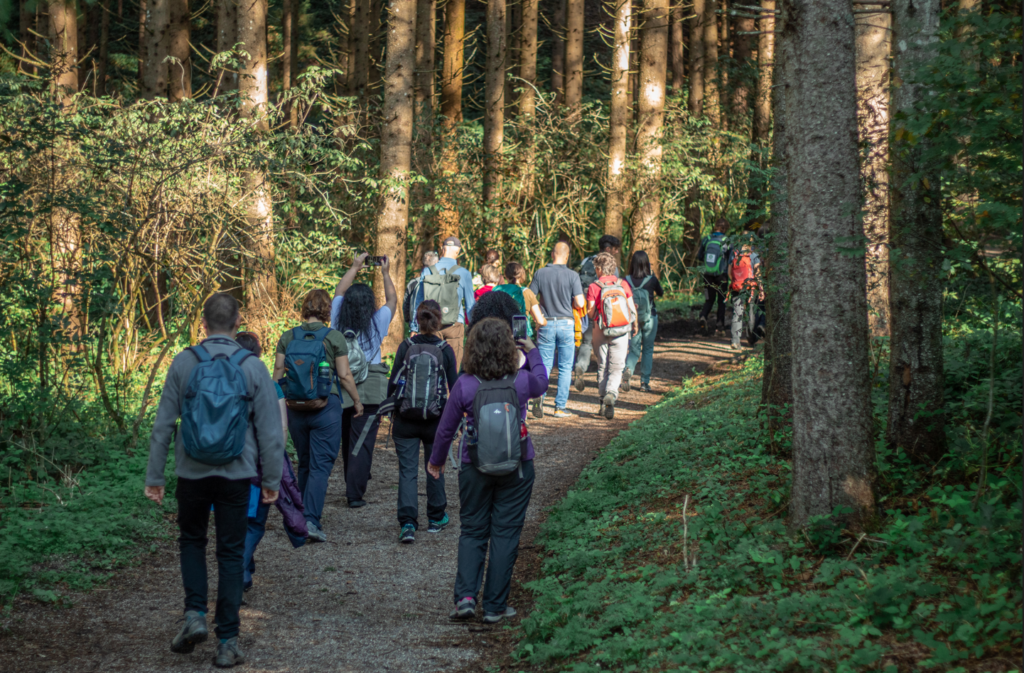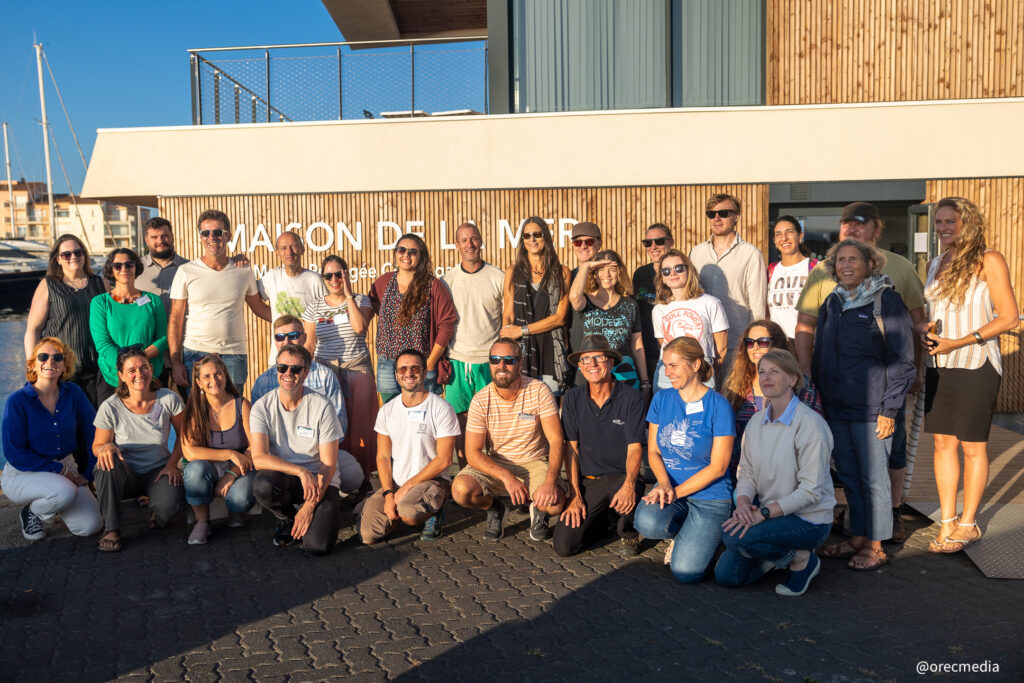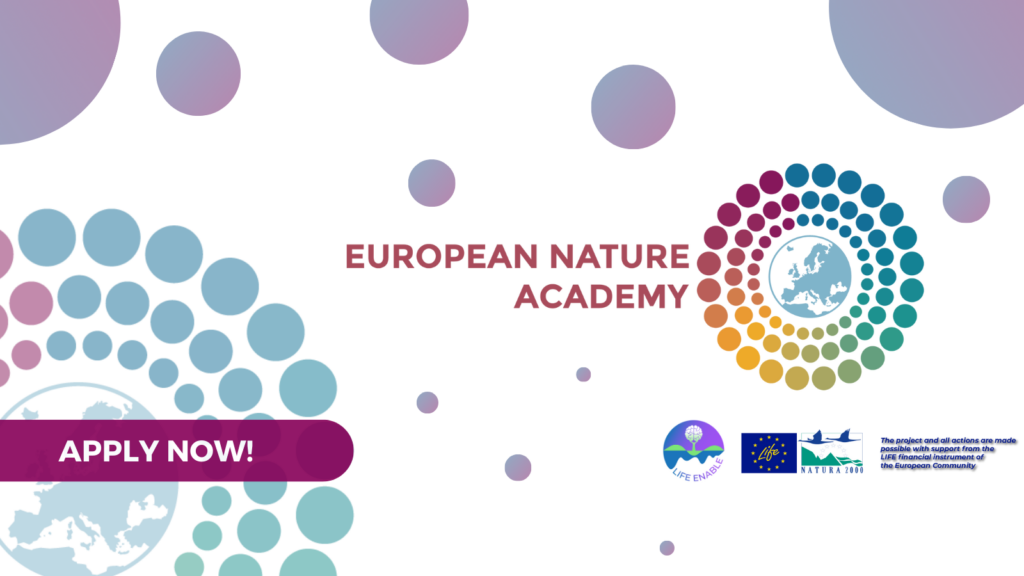European Nature Academy: Face-to-face Workshops for Natura 2000 Marine and Forest Managers
European Nature Academy is an innovative co-learning platform offering cost-free training courses focusing on the competencies required to manage Natura 2000 and Protected Areas more effectively.
Courses focus on core competencies, including stakeholder engagement, communication tools and techniques and management planning. Specific attention is also given to the management of forest and marine ecosystems.
In LIFE ENABLE, Forest and Marine participants are organised in ‘PODs’ – these are small groups created to enable closer joint-working and co-learning between peers.
As part of the ENA programme, participants engaged in interactive courses that were comprised of multiple modules. These courses offered a variety of materials, including live online sessions, videos, e-books, and reading resources, which enabled participants to gain a broader understanding of the training topics. The courses also included interactive activities and assignments that encouraged participants to apply their newly acquired knowledge, as well as their existing skills and experiences. As a culmination of the online courses, face-to-face workshops were organised for Marine Participants in France and for Forest Participants in Austria. These workshops provided an opportunity for participants to put their knowledge into practice and interact with peers and experts in their respective fields.

Forest Workshop took place in Austria
Tools for Natura 2000 Forest Managers
Online courses
The Tools for Natura 2000 Forest Managers course offered insights into:
- Forest conservation and management in Natura 2000
- Forest ecology
- Integrated Natura 2000 Site Management
- Monitoring and assessment
Face-to-face Forest Workshop in Austria
This 4 days workshop was hosted by E.C.O., with support from TESAF and FUNGOBE. A total of 27 participants from Norway, Germany, Cyprus, Spain, Croatia, Lithuania, Austria, Finland, Romania, Germany, Italy, UK, Belgium, Portugal, Latvia, Greece, and Slovenia visited multiple Protected Areas to engage in a range of field-based discussions about management practices being applied.
The workshop included visits to Nature Park Dobratch and Natura 2000 site Leonstein. Robert Heuberger. The Department of the Carinthian Government for Environment, Nature Conservation and Coordination of Climate Protection welcomed participants, followed by Stefano Santi, representing EUROPARC. The topic of the morning visit was climate resilient forests, where the host presented the forestry measures in the Nature Park to create more resilient forest stands. In the afternoon, participants visited the Natura 2000 site Leonstein, to discuss visitors and carrying capacity. The Protected Area is located in an area with considerable tourism: pressure from tourists, leisure tourists and recreationists is massive in the summer months. The area has a very dense network of hiking trails. At the end of the visit to a beech forest stand, a short POD task was organised where participants reflected on the positive and negative points of forest management at the two sites.
On the following day of the forest workshop, the group travelled to the Vellacher Kotschna (AT) in South Carinthia, a Natura 2000 site. The group held a discussion about the challenges of establishing monitoring indicators and explored management practices in privately owned forests within Natura 2000 sites. Later in the afternoon, the group crossed the border into Slovenia and was accompanied by hosts from the Nature Conservation Institute (Davor Krepfl and Sonja Rozman) to an old-growth forest situated in the Kamnisko-Savinjske Alps. The group had an informative session with the hosts, where they discussed the differences and similarities in Natura 2000 management across borders. At the end of the day, Erika Vaida Bela from ProPark organised an exercise that allowed the group to reflect on the day’s topics.
During the visit, the group explored the European Nature Reserve Lendspitz Maiernigg. It represents the last remaining 500 metres of the lake’s natural shoreline with reed belt and adjacent wetlands in an urban setting. The focus of the visit was on invasive species, and Susanne Glatz Jorde from E.C.O. led the group through the area with several stops along the way. An activity was organised where each POD had to identify the invasive species they found in the field. During the lunch break at the Lendkanal on the shore of Lake Woerthersee, Ms. Sara Schaar, the representative of the federal government, spoke to the participants and offered future cooperation in the development of conservation projects.
Later in the afternoon, the group gathered to receive an overview of the guidelines for the final assignment from Mike Huber from E.C.O. They then selected their topics, developed structures for the final paper, and sought feedback from the scholars on their topics.
Following the long day of work, the group concluded the official part of the Forest face-to-face meeting. They were greeted by the vice-Mayor of Klagenfurt, and Hanns Kirchmeir from ECO supported the straightening of Natura 2000 managers network through the LIFE ENABLE project.
The last optional excursion day near Lake Ossiach included a hike through a beautiful beech forest to the Finsterbach waterfalls. The group also enjoyed a breathtaking view of the Ossichersee from the Gerlitzen before driving to the Bleistaeter Marshes, which were previously intensively used as farmland. In 2002, it was designated as a Natura 2000 site after restoration measures were taken. Since 2017, the landscape in the Bleistaeter Wetland area has changed dramatically. Extensive shallow water areas and wetlands have been created on land that was once used for agriculture, with the aim of improving the water quality of Lake Ossiach. This creates an attractive habitat for rare animal and plant species and a unique recreational area.

Marine Workshop took place in France
Tools for Natura 2000 Marine Managers
Through its modules, the Tools for Natura 2000 Marine Managers course highlighted the following topics:
- Policy and governance frameworks for Marine Protected Areas and Natura 2000 Marine Sites
- Marine Protected Area Management Planning
- Compliance and enforcement
- Management Effectiveness
Face to face Marine Workshop in France
The Marine face-to-face Workshop gathered 21 participants from Greece, Lithuania, Malta, Sweden, Scotland, Finland, Italy, Croatia, Spain, Cyprus, and Albania in Agde, France.
The focus of the first day of the workshop was to learn about the different ingredients of an effective MPA network, including selecting sites that work together operationally and understanding the added value that a network can bring to the managers of the MPA.
Through practical exercises, the participants worked on identifying, developing and putting together the main components for their own (fictional) successful MPA network.
The second day of the workshop was dedicated to constructing an effective management plan for MPAs. The participants started by defining the legal framework for an MPA and then worked on identifying target resources, assessing and analysing threats, and developing SMART objectives through practical exercises that helped visualise and make tangible the creation of these plans.
Building on the outcomes of the previous session on the design of an effective MPA Management Plan, the team of the MPA of Côte Agathoise presented their management plan. This covered how their actions have progressed over time and as their operational structures shifted from working as an association to becoming part of the municipality and operating in collaboration as of this governmental branch.
The second part of the second day was dedicated to designing and developing a management strategy that can impact different types of human behaviour that are harmful to the MPA’s target resources. The participants also worked on establishing monitoring and evaluation plans to track the effectiveness of their management strategy.
The day ended with a meeting with different stakeholders who are active within the Côte Agathoise MPA premises. Hosted in La Maison de la Mer, they presented their contribution to biodiversity conservation in the Protected Area and responded to questions from the participants.
During the last day of the Marine workshop, participants learned how to link strategy to law enforcement in MPAs. They learned how to recognise violations, track them, and stop them. The participants worked on identifying threats and the different actions they can take to help prevent illegal activities against the protected species and in no-take zones. They discussed the intricacies of preventing law breaches when it comes to recreational fisheries, as well as other illegal activities they usually encounter in their MPA.
To give participants an idea of how they can utilise law enforcement agents to protect their MPAs, the MPA of Côte Agathoise invited two officers from the rural police task force. The officers gave an overview of their mission within the MPAs and the different methods they use in case of illegal activities spotted in the zone. These methods include gentle reminders, verbal warnings, fines, and arrests. They also explained the training they had to go through to qualify for such missions.
Applying the skills on the ground
During both workshops, ENA participants had unique opportunities to experience various Marine and Forest ecosystems. They engaged in active discussions with experts and collaborated with their peers on interactive assignments, all while visiting breathtakingly beautiful Protected Areas in Austria and France. To get a glimpse of their productive workshops and experience the atmosphere, you can browse through the photo album capturing the highlights of their learning journeys.
ENA second round of applications
Did you find these insights interesting? Would you also like to enhance your skills, whilst networking with nature professionals from all over Europe?
If the answer is yes, you are in luck! European Nature Academy is currently still accepting applications for the 2nd intake of participants. You have a chance to apply until November 4th! Learn more and apply here!
